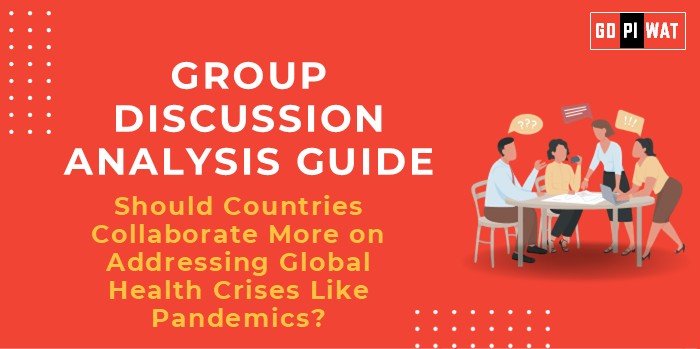📋 Group Discussion (GD) Analysis Guide
🌍 Should Countries Collaborate More on Addressing Global Health Crises Like Pandemics?
🩺 Introduction to the Topic
Opening Context: “Global health crises such as COVID-19 have highlighted the interdependence of nations in tackling pandemics. The question now arises: Should countries intensify their collaboration to effectively manage such crises?”
Topic Background: Health crises have become global challenges due to their cross-border impact on health, economies, and security. Initiatives like the World Health Organization (WHO) and global vaccine alliances (e.g., Gavi) underscore the necessity of multilateral cooperation.
📊 Quick Facts and Key Statistics
- 💰 Global Pandemic Cost (COVID-19): Estimated $28 trillion over 2020-2025 (IMF) – Highlights the economic impact of pandemics.
- 💉 Vaccine Development Time for COVID-19: 10 months (Pfizer-BioNTech) – Demonstrates the power of international collaboration.
- 👩⚕️ Health Workforce Shortage: 18 million by 2030 (WHO) – Indicates a pressing need for capacity building.
- 🔍 Pandemic Preparedness Spending Gap: $10 billion annually (Global Preparedness Monitoring Board) – Reflects underfunded readiness systems.
👥 Stakeholders and Their Roles
- 🏛️ Governments: Establish healthcare policies, fund public health initiatives, and lead crisis responses.
- 🌐 WHO and International Organizations: Coordinate global health efforts and provide technical expertise.
- 💊 Private Sector (Pharmaceuticals): Innovate and manufacture medical solutions, including vaccines.
- 🛠️ Nonprofits and NGOs: Facilitate grassroots interventions and provide emergency aid.
- 👩⚖️ Citizens: Engage in prevention and compliance with public health measures.
🏆 Achievements and Challenges
🌟 Achievements:
- 💉 Vaccine Distribution: COVAX delivered over 2 billion doses globally.
- 📊 Data Sharing Success: The Global Influenza Surveillance and Response System shares critical disease data.
- 🚸 Eradication Campaigns: Polio nearly eradicated through multilateral campaigns.
- 💸 International Funding: The Global Fund raised $4 billion for pandemic readiness.
⚠️ Challenges:
- ❌ Vaccine Inequity: Low-income countries vaccinated less than 20% of populations by 2022.
- 🗣️ Misinformation Spread: Undermined public health campaigns globally.
- 💰 Funding Gaps: Insufficient contributions to international health organizations.
Global Comparisons:
- ✅ South Korea’s Pandemic Management: Efficient public-private data integration reduced mortality.
- 🌍 Africa’s Ebola Response: Regional collaborations prevented global outbreaks.
Case Studies: India’s Vaccine Diplomacy (Vaccine Maitri): Distributed over 100 million doses to 90 countries, fostering goodwill.
✨ Structured Arguments for Discussion
- 💬 Supporting Stance: “Global collaboration accelerates vaccine development and ensures equitable distribution.”
- ⚖️ Opposing Stance: “National sovereignty and varying priorities hinder effective coordination.”
- 🔄 Balanced Perspective: “While collaboration is essential, sovereignty concerns require tailored approaches for each nation.”
🎯 Effective Discussion Approaches
- 📖 Opening Approaches:
- “The COVID-19 pandemic demonstrated that no nation can tackle global health crises alone.”
- “Collaborative initiatives like COVAX have proven that unity is essential for pandemic management.”
- 🔄 Counter-Argument Handling:
- “While national interests are critical, pandemics require a global perspective to avoid prolonged economic and health impacts.”
📈 Strategic Analysis of Strengths and Weaknesses
- 💪 Strengths: Rapid innovation, multilateral funding, and global solidarity.
- ⚠️ Weaknesses: Geopolitical tensions, funding disparities, and capacity gaps.
- 💡 Opportunities: AI in health monitoring, stronger global treaties, and public-private partnerships.
- 🚨 Threats: Misinformation, vaccine nationalism, and emerging zoonotic diseases.
📚 Connecting with B-School Applications
- 🌟 Real-World Applications: Opportunities in healthcare management, international trade, and crisis leadership.
- 💬 Sample Interview Questions:
- “How should business leaders prepare for global health crises?”
- “What role can public-private partnerships play in pandemic preparedness?”
- 📖 Insights for B-School Students:
- Leverage crisis management experience in healthcare consulting and global logistics.


